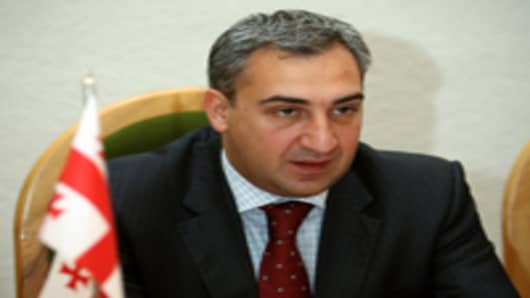Like the song goes, Georgia comes in and out of our geopolitical minds. In 2008, it was in during their war with Russia. In 2009, it was out while they rebuilt. And, now in 2010, it's so in.
The Black Sea state expects 5-6% GDP growth this year, followed by another 4.5% growth in 2011 — all of which to say that Georgia is committed to distancing itself from Russia.
“We had a quite difficult year in 2009; however, we’re on our way to recovery,” Georgia’s Prime Minister Nikoloz Gilauri told me in an exclusive interview on CNBC’s “Worldwide Exchange.”
Gilauri said that the first six months of 2010 were especially impressive, as the country saw GDP growth of 6.5%. Tourism, banking and exports, mainly of agricultural goods, have been the main drivers of growth so far.
The country’s success hasn’t gone unnoticed. According to Gilauri, foreign direct investment is up as well, making Georgia — which sits at the juncture of Eastern Europe and Western Asia — an investment hub in the region. Foreign direct investment is projected to reach $750 million in 2010. The number of visitors to Georgia increased 40% this year over last year, said Gilauri, suggesting that travelers for business and for pleasure have confidence in the country’s stability.
A lynch pin for economic success in Georgia, as well as neighboring Turkey and nearby Bulgaria, is oil independence. Bulgaria learned that lesson the hard way in 2009, when price disputes between Ukraine and Russia led oil supplies to be cut off for two weeks.
“We were dependent on one source, and that was Russia,” said Gilauri of Georgia’s electricity and gas supplies. Now, he said, Georgia is a regional hub for energy and gas. “There is gas flowing from north to south, crossing Georgia. From east to west, crossing Georgia.”
Oil is crossing Georgia, too — according to Gilauri, almost 1.5% of the world’s total consumption of it passes through the country.
Georgia’s plan for energy sufficiency is three-pronged, and based on help from some of their friends in the area. First, Georgia will work with Bulgaria to buy compressed natural gas from Azerbaijan, which will cross Georgia in pipelines before being shipped across the Black Sea. Second, Bulgaria can also buy Azeri gas, which will move through Turkey after the two Balkan states build a 47-mile pipeline to link their natural gas grids, thereby providing another supplier for Georgia. Lastly, the Balkan states can try delivering liquefied Azeri gas through Georgia and the Black Sea to Romania and Bulgaria.
Gilauri said that, so far, talks with Bulgaria are going well, and he hopes that the two countries will set their energy plans in motion with the next couple of years.
Georgia’s economic reformation comes despite still heightened tensions with neighboring Russia. This time, it's over its bid for World Trade Organization membership. While Georgian officials tell me does not oppose Russian membership officially, the country has taken a hard line: Russia must play by the rules, or not at all.
The main “rule” in question is that of transparency at customs checkpoints and customs borders between WTO members. Gilauri tells me Russia as ignoring that rule by continuing to occupy two of Georgia’s territories, even though Russia declared those territories independent after the war in 2008.
“Unfortunately right now, because of occupied territories of Abkhazia and South Ossetia, these two types of checkpoints are not transparent,” he said.
The situation is made even more awkward because President Obama has vocally supported Russia’s bid for WTO membership. Secretary of State Hillary Clinton, on the other hand, has just publicly called for Russian troops to pull out of Georgia. The Clinton nod made a usually stoic delegation visibly excited — they're all here in Washington D.C. for International Monetary Fund meetings.
As Ray sang, "the road leads back to you." For a country slightly smaller than South Carolina, Georgia is making noise even in the midst of a chaotic G20 attention-grab here. While their plans may just be a swan song, for now, it seems that Georgia's set for serious economic reformation — whether Russia’s in or out.
Questions? Comments? Email us atNetNet@cnbc.com
Follow NetNet on Twitter @ twitter.com/CNBCnetnet
Facebook us @ www.facebook.com/NetNetCNBC
Follow Nicole on Twitter @twitter.com/nicolelapin
Facebook us @ www.facebook.com/NicoleCNBC



